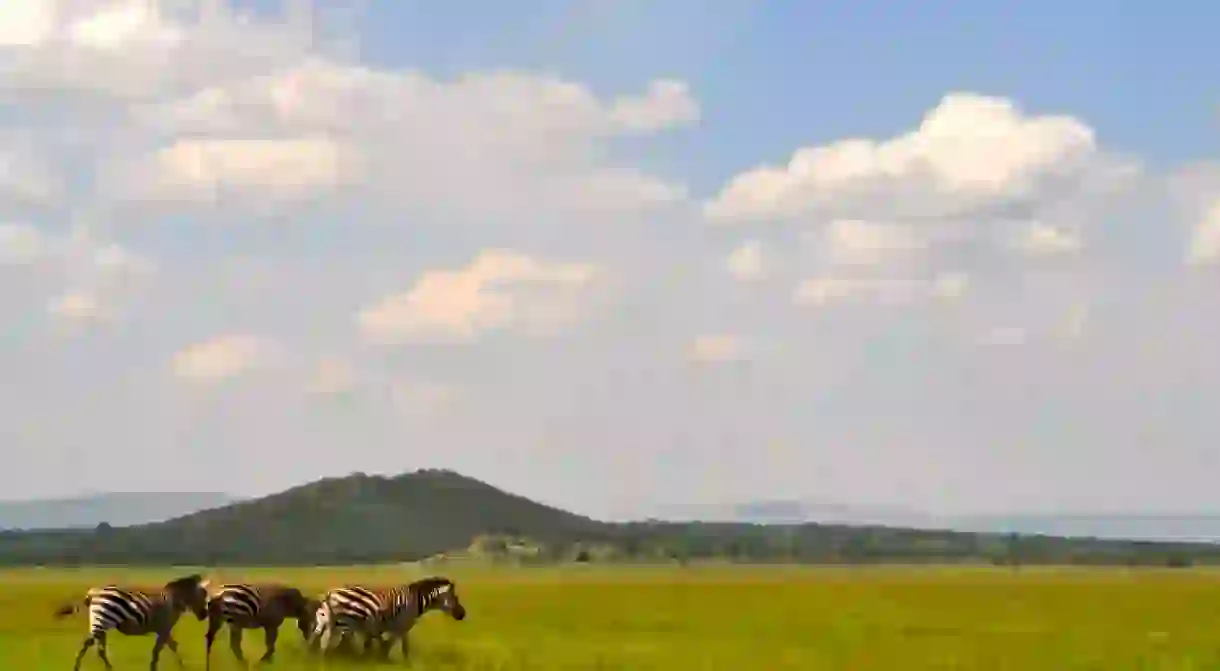An Essential Guide to Akagera National Park

Akagera National Park, home to Africa’s big five in Rwanda, is famous for its panoramic views, exciting wildlife, and easy access. The park’s impressive focus on conservation and the surrounding Rwandan community is admirable, and the price is right. So get those safari hats ready, and read on for our essential guide to Akagera National Park.
Located in northeastern Rwanda along the country’s border with Tanzania, the park was founded in 1934. However, it was reduced in size in the late 1990s in order to give the surrounding communities adequate farmland. Although many of the animals in the park were killed during the 1994 genocide against the Tutsi, the park reintroduced lions in 2015, and black rhinos in 2017. As Central Africa’s largest protected wetland, Akagera today is flourishing under the guidance of the Rwandan Development Board and African Parks – a conservation organisation based in South Africa.

The scenery in the park changes dramatically from the southern end to the northern point, and sightings of giraffes, hippos, zebras, water buffaloes, elephants, antelopes, and all sorts of diverse bird species are very common. Though lesser known than the parks of Kenya or Tanzania, through conservation and dedication, Akagera will undoubtedly be a park to contend with in just a few years.

Visiting Akagera is fairly simple. The southern gate is located a mere two hours from the capital city of Kigali, and the park fee is US$40 a day for foreign visitors. A Step Into Nature offers day-trips for reasonable prices, and companies like Primate Safaris and Volcanoes Safaris offer multi-day trips. You can also take the more adventurous route and rent a 4×4 to self-drive through Akagera’s wetlands, savannahs, and hilltops. Even if you’re driving yourself, you can always hire a knowledgeable guide at the entrance for US$20 for half a day. The guides have been trained intensively and are usually from the surrounding towns.

In addition to general safari drives, the park also offers plenty of activities, such as boat trips, fishing tours, walking excursions, and cultural exchanges. Sunset or sunrise boat trips on Lake Ihema (US$40 per person) are unforgettable, with a guaranteed sighting of lazing crocodiles or shy hippos. These trips can be booked in advance through the African Parks website, as well as organised upon arrival at the park entrance.

Accommodation options are currently limited, but the park plans to expand offerings in 2018. For now, spend your evenings at the luxurious Ruzizi Lodge for an memorable glamping experience under the stars and near a family of playful hippos, or the Karenge Bush Camp for a view of the spectacular northern plains. The mid-market Akagera Game Lodge is, while a bit dated and due for renovations very soon, another good alternative for safari goers on a tighter budget. However, the best option for budget and intrepid travellers is definitely camping. Campsites are available throughout the park, with the northern site Mutumba offering the best views. Camping maps can be found at the park entrance, and it costs US$20 per person to camp for a night in addition to the added cost of renting a tent (if you need one). The campsites are all stocked with barbecue equipment and firewood, as well as pit latrines, and are a stunning, quiet, and a great way to see the park. Evenings are best spent here with a guitar in hand, a group of friends around, and lots of s’mores being eaten around the fire.













